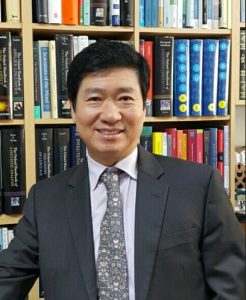Keynote Speaker
Prof. Seongha Rhee
Mahidol University, Thailand; Hankuk University of Foreign Studies, Korea
Keynote Title:
Grammaticalization of Fear: The Case of Apprehensionals in Korean
Abstract:
Fear seems to be a semantic primitive in human language (cf. Wierzbicka 1992, 1999). It is felt by all humans at varying degrees of intensity and has a number of linguistic manifestations. Korean has a number of grammatical forms that encode the speaker’s apprehension, i.e., apprehensionals (or ‘preventive’; Ramstedt 1997[1939], Kim 1960, Ko 1989, Son 1994). Their primary function is to warn the addressee of potentially harmful consequences of an action, or to present reasons of the speaker’s action or mental state (cf. lest, for fear of, etc. in English).
Apprehensionals have been grammaticalized to varying extents from diverse constructions, forming multiple layers in contemporary Korean. They developed mostly from uncertainty of the future, i.e., their source constructions involve a future-marker, a question marker, a cognitive verb, or a mode- or purpose-adverbializer, or a combination of two or more of them.
In most cases the notion of apprehension is fully semanticized, thus cannot be canceled, but in some apprehensives the notion of apprehension for undesirable events or states is only pragmatically inferred. The role of pragmatic inference is also evident with some cases that mark not only undesirability (i.e., ‘for fear of’) but also precaution (i.e., ‘lest’), through pragmatic strengthening of attributing conation to the potential agent. Certain cases suggest the role of collocates in semantic change. For instance, the futuristic question marker denoting ‘will it…?’ formerly occurred frequently with a range of psych-verbs, e.g. ‘think’, ‘doubt’, ‘consider’, ‘worry’, ‘feel ashamed’, ‘be wary’, etc. and it absorbed the negative meaning from these collocates and could signal apprehensive even when it did not occur with them, thus now functioning as a full-fledged apprehensive (cf. Lichtenberk 1995). This is a good exemplar of ‘absorption’ as proposed by Bybee et al. (1994), a phenomenon often observed in other grammaticalization scenarios involving insubordination in Korean. Further, through insubordination, some apprehensive connectives have extended their functions to sentence-final particles marking tentative intention, doubt, indeterminateness, possibility, etc., a state of affairs bringing forth theoretical issues about the developmental directionality (cf. Dobrushina 2006, Pakendorf and Schalley 2007). Subjectification is prominent in the development of certain apprehensionals from the verb denoting ‘not know’ along the line of semantic change: ‘have no knowledge’ > ‘be uncertain’ > ‘be worrisome’ > ‘be apprehensive’, suggesting a general direction from epistemic possibility to apprehensionals.
Drawing upon historical data, this talk traces the developmental paths of apprehensives and analyzes the morphosyntactic and semantic mechanisms that enabled the processes, with reference to the principles proposed by Kuteva et al. (2019). It further addresses how these multiple forms in multiple layers coexist with differential degrees of specialization.
Bio:
 |
Seongha Rhee is Professor of Linguistics of Mahidol University, Thailand and Professor Emeritus of Hankuk University of Foreign Studies, Korea. He received his Ph.D. in linguistics from the University of Texas, Austin in 1996. The administrative positions he held at HUFS include Vice-President of External Affairs, Dean of the Graduate School of TESOL, and Dean of Academic Affairs. He served the International Circle of Korean Linguistics (president, 2019-2021), the Linguistic Society of Korea (president, 2013-2014) and the Discourse and Cognitive Linguistic Society of Korea (president, 2009-2011). He published Linguistic Forms at the Border of Lexis and Grammar: Grammaticalization of Adpositions across Languages (2021, Global Contents), Understanding Grammaticalization (2016/1998, Hankook Publisher), World Lexicon of Grammaticalization (2019, CUP, co-author); book chapters in Grammaticalization Scenarios (2020, Mouton), Studies at the Grammar-Discourse Interface (2021, Benjamins), The Cambridge Handbook of Korean Linguistics (2021, CUP), Pejoration (2016, Benjamins), Shared Grammaticalization (2013, Benjamins), Nominalization in Asian Languages (2011, Benjamins), The Oxford Handbook of Grammaticalization (2011, OUP), Rethinking Grammaticalization (2008, Benjamins), and a few others; and research articles in journals including Nature (co-author), Journal of Pragmatics, Language Sciences, Terminology, Lingua, and Journal of Historical Pragmatics, among others. He has served a number of editorial boards of academic journals. His primary research interest is to identify cognitive and discursive mechanisms that enable language change from the crosslinguistic and typological perspectives. http://srhee.net; https://www.researchgate.net/profile/Seongha_Rhee |

